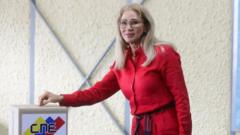In Venezuela, the ruling United Socialist Party of Venezuela (PSUV) has claimed a resounding victory in recent regional and parliamentary elections, which faced widespread opposition boycott. The national electoral body reported that PSUV candidates won the gubernatorial races in 23 out of 24 states and secured over 82% of votes in the National Assembly, despite opposition leaders denouncing the election process as a sham and noting low voter turnout.
Venezuela's Ruling Party Declares Victory Amid Opposition Boycott

Venezuela's Ruling Party Declares Victory Amid Opposition Boycott
Venezuela's elections yield 'overwhelming victory' for Maduro's party, as opposition refrains from participation.
The National Electoral Council (CNE), influenced by government affiliates, announced that PSUV candidates triumphed in nearly all gubernatorial contests, enhancing their hold from 20 to 23 governorships. In an analysis of polling activity, independent journalists highlighted significantly fewer voters compared to past elections. Leader of the main opposition faction, María Corina Machado, asserted that the participation rate was below 15%, hence accusing the government of oppression and manipulation.
Political backdrop reveals that opposition parties have continuously disputed the legitimacy of the CNE's operations, particularly following allegations of skewed vote tallies in the prior presidential elections. Amid ongoing repression, former presidential candidate Edmundo González was forced into exile, while Machado, barred from running herself, encouraged a boycott of the current elections.
Despite the major opposition parties' stance, a minority of opposition figures chose to compete, which led to accusations of betrayal from boycott proponents, including Machado. The election results indicate that while Maduro's coalition gained a stronger legislative presence, some opposition candidates, including the notable Henrique Capriles, secured seats in the National Assembly.
The elections were marked by significant pre-election arrests, with over 70 dissenters detained under accusations of conspiring to disrupt the voting process. Machado labeled this crackdown as state terrorism. The elections also attempted to include representatives for the disputed Essequibo region, despite a ruling from the International Court of Justice urging Venezuela not to conduct these elections, which were carried out without proper control of the territory.
As political tensions rise, the situation reinforces the divide between the Maduro government and opposition forces in Venezuelan politics, emphasizing the ongoing instability and lack of consensus on democratic processes in the country, amid international scrutiny and condemnation.
Political backdrop reveals that opposition parties have continuously disputed the legitimacy of the CNE's operations, particularly following allegations of skewed vote tallies in the prior presidential elections. Amid ongoing repression, former presidential candidate Edmundo González was forced into exile, while Machado, barred from running herself, encouraged a boycott of the current elections.
Despite the major opposition parties' stance, a minority of opposition figures chose to compete, which led to accusations of betrayal from boycott proponents, including Machado. The election results indicate that while Maduro's coalition gained a stronger legislative presence, some opposition candidates, including the notable Henrique Capriles, secured seats in the National Assembly.
The elections were marked by significant pre-election arrests, with over 70 dissenters detained under accusations of conspiring to disrupt the voting process. Machado labeled this crackdown as state terrorism. The elections also attempted to include representatives for the disputed Essequibo region, despite a ruling from the International Court of Justice urging Venezuela not to conduct these elections, which were carried out without proper control of the territory.
As political tensions rise, the situation reinforces the divide between the Maduro government and opposition forces in Venezuelan politics, emphasizing the ongoing instability and lack of consensus on democratic processes in the country, amid international scrutiny and condemnation.





















